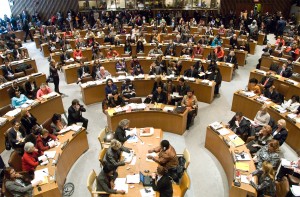Gender Matters! Can the UN bring change?
Posted on March 9, 2010.
Guest Blogger Wendy Harcourt on Beijing +15 -– Commission on the Status of Women March 1 to 12

Getting in here can be a real hassle. Credit Bomoon Lee/IPS
Well, two predictions of mine are bearing out. First, the chaos of organising such a large meeting led to some people queuing for five to eight hours to register for the official CSW meeting. On the bright side, such long waiting times did mean unplanned networking and a sense of solidarity among the thousands of participants despite the indignity of it all. It also led to the absurdity of one of the key speakers of an official opening panel failing to get in to speak because she was stuck in a queue.
Once people managed to get their badges, the next hassle was getting into the sessions. There are passes for official meetings — which of course ran out — and in the NGO parallel space the large numbers and fire restrictions meant even those willing to stand or sit on the floors were being turned out.
Rumours have it there are over 8,000 women here.
Personally, I had a lucky time of it. I only waited one and a half hours and used the time to chat to an old friend and meet new ones. I had heard about the queues on the first day, so I got there first thing on the second day. And I managed to squeeze into the sessions, even got to sit on a chair in one.
And the other prediction was that the sense of economic crisis looms large. From snatched corridor conversations it is clear that most women are not celebrating Beijing as such. There is a sense that Beijing promises were great on paper but the implementation has not brought women’s rights nor freedom and autonomy to the centre of development.
There are still vast inequalities among women and men and many are more marginalized from power, poorer and much more vulnerable than they were in 1995.
One of the sessions I attended was by Social Watch, the Association of Women’s Rights in Development (AWID) and Development Alternatives with Women for a New Era (DAWN), on the impact of the financial crisis across the regions. The statistics and indicators show there are very different worlds that women inhabit depending on where they live, their education, assets and access to decision making and bargaining power.
For most though, the financial crisis is just building on the other crises of food, care and climate. It is further proof of the failure of the economic system. Poor women who have never experienced the benefits of the economic system do not see crisis as new, just that it is now more talked about. Life continues but is perhaps a little harder.
Some, who had gained employment through globalization particularly in Asia and Latin America, are losing those same jobs. Government bale outs are not for the sectors where women are employed but for those where mainly men work.
Women know how to cope if circumstances allow. The problem is the system is not listening to those ways of coping and building on them. And there are not enough knowledgeable women in the right places to make the difference. There is anger over the failure of decision makers to take into account the information, analysis and knowledge of gender in trade, taxation, decent work, the care economy, informal sector and migration.
As one woman from Africa commented, women have been saying the same thing for years. Why are people not listening?
That seems to be the main issue in the sessions so far: how to change the system so that women’s rights, economic and political realities are seen as core to a fair and just and sustainable development.
But as another participant from Latin America said, “why do we expect the UN and governments to take up our agenda? We have to make our own agenda.”
Perhaps this talk of crisis, of needing governments not markets, has to create a much stronger demand for new systems that move away from the UN’s old approach of business as usual.
From Pakistan, another participant pointed out that the Millennium Development Goals, the framework in which development is practiced, is not looking at rights and freedom of women to choose their lives, including having children, having jobs, having pleasure, making change happen in their lives.
Rather it is about how to provide education, how to avoid maternal mortality how to stop HIV and AIDS. Women’s rights, particularly their sexual and reproductive rights, disappear in the barrage of neatly divided silos and indicators, which bear little resemblance of messy reality of women’s lives.
Are there new forms of democracy and politics that can answer to today’s realities? How do the women here counter the floundering corrupt governments, of rising fundamentalism and racism, the frank greed of businesses and capitalism, of conflict and ravaged environments?
As usual, I and most of the women here have many more questions than answers. We will see how the next days unfold.

